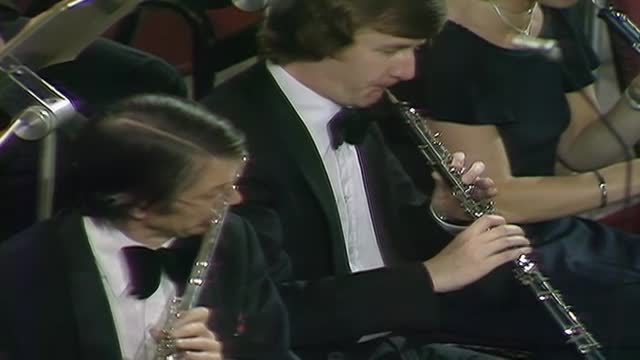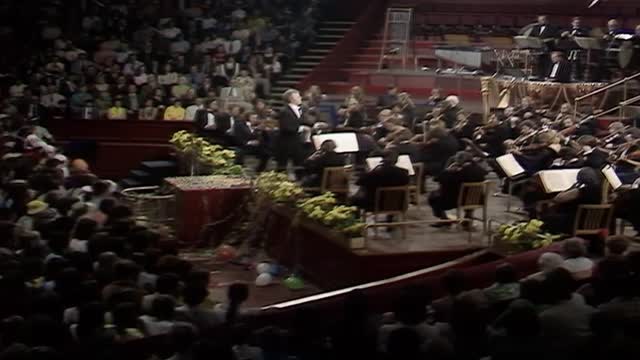Educated in his home city of Glasgow, James Loughran conducted at school and afterwards, while studying economics and law. When he sought the advice of one of the Scottish National Orchestra’s conductors, Karl Rankl, on how to develop his musical career, Rankl suggested that he gain experience by working in the German opera house system. Loughran therefore obtained a position as a répétiteur with the Bonn Opera in 1958, where he came into contact with Peter Maag, and subsequently worked in the same capacity with the Netherlands Opera and in Italy, in Milan. He won first prize in 1961 in the Philharmonia Orchestra’s Young Conductors’ Competition which led to appearances with this orchestra and to his appointment first as assistant conductor (1962–1964) and then as associate conductor (1964–1965) with the Bournemouth Symphony Orchestra, working alongside its chief conductor Constantin Silvestri. Loughran continued to conduct opera, leading the successful première at Sadler’s Wells Theatre in 1963 of Malcolm Williamson’s Our Man in Havana (later produced in Germany, Belgium, Hungary and the USA) and Aida at the Royal Opera House, Covent Garden, in 1964.
In 1965 Loughran was appointed as chief conductor of the BBC Scottish Symphony Orchestra, working with them for six years. During 1969 he conducted all the Beethoven symphonies with the London Symphony Orchestra at the invitation of the European Broadcasting Union, whose members broadcast the cycle during the Beethoven bicentenary year. His operatic work continued, with the English Opera Group (1966) and with Scottish Opera (1968). Loughran’s most significant move came in 1971 when he was appointed as chief conductor of the Hallé Orchestra in Manchester, in succession to Sir John Barbirolli. He remained in this post for twelve years, during which he maintained the orchestra’s busy schedule established by Barbirolli and its management, and recorded extensively with it, principally for EMI’s Classics for Pleasure label. The label engaged the orchestra as a means to boost its low sales in the north of England, and the combination of the Hallé and Loughran resulted in many of its finest recordings.
Loughran made his North American début with the New York Philharmonic Orchestra in 1972 and went on to guest-conduct throughout America and Japan as well as in Europe. In addition to his work in Manchester he was chief conductor of the Bamberg Symphony Orchestra between 1979 and 1983, the first British conductor to hold such a position with a German orchestra. He was appointed the Hallé’s conductor laureate in 1983, while still maintaining a busy career as an international guest conductor. Between 1996 and 2003 he served as chief conductor of the Aarhus Symphony Orchestra in Denmark, with whom he recorded the complete works for piano and orchestra by Rachmaninov and both Brahms’s and Dvořák’s Serenades.
James Loughran is a greatly under-estimated conductor. Succession to Barbirolli in Manchester was a double-edged sword, in that it was impossible to replicate Barbirolli’s performances, while at the same time and for the same reason it was difficult to establish his own musical personality with the orchestra (a situation that Barbirolli himself had experienced in America when he succeeded Toscanini at the New York Philharmonic Orchestra). That Loughran was able to maintain his position with the orchestra successfully for twelve years is indicative of his strengths as a musician and conductor, strengths further evidenced in his recordings with the Hallé. These include an immensely satisfying set of the Brahms symphonies; distinguished complete cycles of the Beethoven and Elgar symphonies and of the Brahms piano concertos with John Lill, and passionate accounts of Berlioz’s Symphonie Fantastique and Rachmaninov’s Symphony No. 2, as well as notable readings of Holst’s The Planets, Walton’s Belshazzar’s Feast, John McCabe’s The Chagall Windows and Variations on a Theme of Hartmann, and music by the Strauss family. In addition to Loughran’s Danish recordings, he has accompanied the Turkish pianist Idil Biret in Saint-Saëns’s Piano Concertos Nos 2 and 4 for Naxos. Throughout all these performances Loughran’s innate musicianship is fully apparent.
© Naxos Rights International Ltd. — David Patmore (A–Z of Conductors, Naxos 8.558087–90).
| Title | |
| BRAHMS, J.: Piano Concerto No. 2 / CHOPIN, F.: Scherzo No. 1 / Polonaise No. 6 / LISZT, F.: Funerailles (Ohlsson) | |

|
BRAHMS, J.: Piano Concerto No. 2 / CHOPIN, F.: Scherzo No. 1 / Polonaise No. 6 / LISZT, F.: Funerailles (Ohlsson)
Composers:
Brahms, Johannes -- Chopin, Fryderyk -- Liszt, Franz
Artists:
BBC Symphony Orchestra -- Loughran, James -- Ohlsson, Garrick
Label/Producer: ICA Classics |
| VIENNESE NIGHT AT THE PROMS (Furst, Loughran, Susskind) | |

|
VIENNESE NIGHT AT THE PROMS (Furst, Loughran, Susskind)
Composers:
Lehar, Franz -- Strauss I, Johann -- Strauss II, Johann -- Suppe, Franz von
Artists:
Armstrong, Sheila -- BBC Northern Symphony Orchestra -- BBC Symphony Orchestra -- Furst, Janos -- Halle Orchestra -- Loughran, James -- Royal Philharmonic Orchestra -- Susskind, Walter
Label/Producer: ICA Classics |
